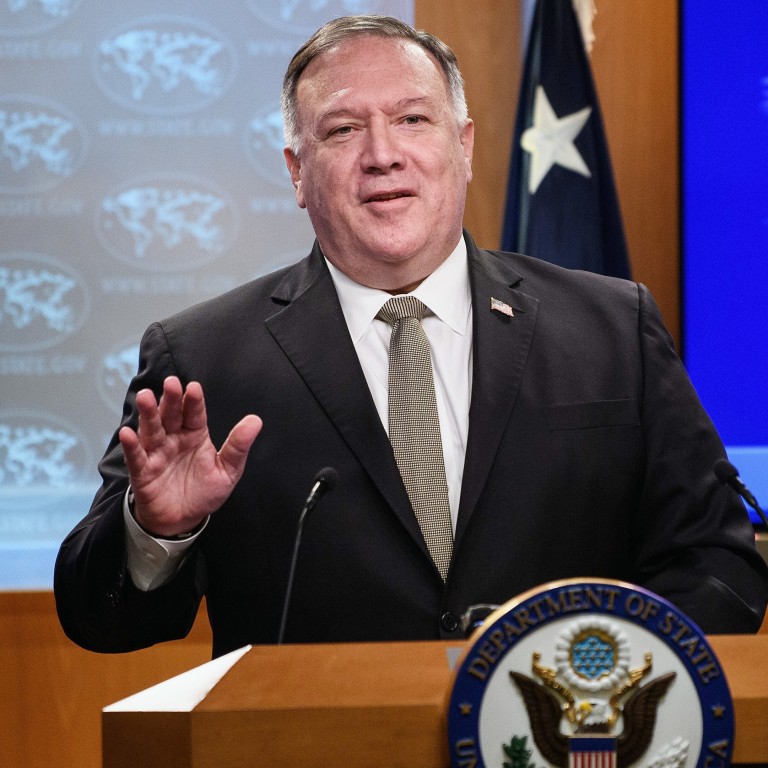
Asean nations should not allow themselves to be ‘bullied’ by Beijing in South China Sea, Pompeo says
- The US lays no claim to the South China Sea but the Trump administration has recently imposed sanctions on Chinese officials responsible for Beijing’s military build-up in the area
- US secretary of state addressed Asean conference and urged nations to reconsider business dealings with these Chinese state-owned companies
“I think keep going, don’t just speak up but act,” Pompeo told top diplomats from the 10-nation bloc, without elaborating. A State Department spokeswoman said he pressed for a peaceful resolution of the disputes.
China does not respect democratic values and principles of sovereignty, quality and territorial integrity enshrined in the Asean charter, Pompeo said. He cited the US blacklisting of about two dozen Chinese companies for their roles in constructing artificial islands in the disputed waters that infringe on other states’ claims.
“Reconsider business dealing with the very state-owned companies that bully Asean coastal states in the South China Sea,” Pompeo said. “Don’t let the Chinese Communist Party walk over us and our people. You should have confidence and the American will be here in friendship to help you.”
It’s not clear how many Asean members have dealings with the Chinese construction companies blacklisted by the US Commerce Department. But Philippine President Rodrigo Duterte’s administration said last week it would not follow the US move and will allow one of the blacklisted firms or its subsidiary to partner with a local company for an airport project in Cavite province south of Manila.
China says it has historical sovereignty over most of the waterway but its neighbours and the US say that claim has no basis in international law, including the 1982 United Nations Convention on the Law of the Sea (UNCLOS), to which China is a signatory.
In a joint statement released late on Thursday, Asean member states said progress had been made in negotiations to draft a code of conduct in the South China Sea that was consistent with international law, including UNCLOS.
“Concerns were expressed by some Ministers on the land reclamations, activities, and serious incidents in the area, which have eroded trust and confidence, increased tensions, and may undermine peace, security, and stability in the region,” the statement said.
The US has challenged China’s sweeping territorial claims by deploying warships and fighter jets for what it calls freedom of navigation and overflight patrols in the disputed waters.
China’s Wang Yi slams US for being ‘biggest driver’ of South China Sea militarisation
There was no immediate comment from China or its foreign minister, Wang Yi, who was participating in the Asean meetings and separately met the group’s ministers on Wednesday. China has insisted it has right to safeguard its national interests and accuses Washington of interfering in regional affairs.
Vietnamese Foreign Minister Pham Binh Minh, whose country is hosting Asean meetings this year, warmed up to Pompeo’s remarks, saying “the Asean-US relationship has brought about mutual benefit to both sides”.
“The US role and contribution to maintaining peace, stability and security in the region are encouraged,” he said.
Treat Mekong droughts like South China Sea: ex-Singapore diplomat
Asean, founded in 1967, has struggled to stay away from the escalating rivalry between Washington and Beijing. It has often asserted its “centrality” and regional leadership although some critics dismiss the group as a talk shop that is often vulnerable to the sway of world powers.
Depending on how Asean deals with issues, “they can either result in disaster or a new dawn of peace and stability for our region,” Malaysian Foreign Minister Hishammuddin Hussein told colleagues on Tuesday.
“The challenge here is leadership – do we lead or do we follow?” he asked. “Make no mistake – Southeast Asia intends to remain the master of its own destiny.”
Additional reporting by Reuters

